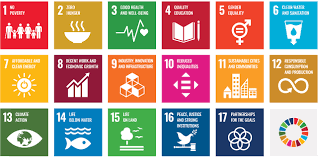The Importance of Sustainable Development Goals (SDGs)
Sustainable Development Goals (SDGs) are a universal call to action to end poverty, protect the planet, and ensure that all people enjoy peace and prosperity. Adopted by all United Nations Member States in 2015 as part of the 2030 Agenda for Sustainable Development, the SDGs provide a framework for addressing global challenges and creating a more sustainable future for all.
Key Aspects of SDGs
The SDGs encompass 17 goals that cover a wide range of critical issues, including eradicating poverty, promoting gender equality, ensuring quality education for all, combating climate change, and fostering sustainable economic growth. Each goal is interconnected and contributes to the overall vision of creating a more equitable and sustainable world.
Why SDGs Matter
SDGs are crucial because they provide a roadmap for governments, businesses, civil society organisations, and individuals to work together towards common objectives. By aligning their efforts with the SDGs, stakeholders can make meaningful contributions to addressing pressing global challenges and building a better future for generations to come.
Role of Individuals in Achieving SDGs
While governments play a key role in implementing policies that support the SDGs, individuals also have a significant impact on their achievement. By making sustainable choices in their daily lives, such as reducing waste, conserving energy, supporting ethical businesses, and advocating for social justice issues, individuals can contribute to advancing the SDG agenda.
Conclusion
In conclusion, Sustainable Development Goals (SDGs) represent a shared vision for creating a more sustainable and inclusive world. By working together and taking concrete actions aligned with the SDGs, we can overcome global challenges and build a brighter future for all. It is essential for everyone to embrace the principles of sustainability and actively contribute to achieving the SDGs to ensure a better world for current and future generations.
Understanding the Sustainable Development Goals: Key Questions Explored
- What are Sustainable Development Goals (SDGs)?
- Why are SDGs important?
- How many SDGs are there?
- How can individuals contribute to achieving the SDGs?
- What is the role of governments in implementing the SDGs?
- Are the SDGs achievable by 2030?
What are Sustainable Development Goals (SDGs)?
Sustainable Development Goals (SDGs) are a set of 17 global objectives established by the United Nations to address pressing challenges such as poverty, inequality, climate change, environmental degradation, peace, and justice. These goals serve as a universal call to action for governments, businesses, civil society, and individuals to work collaboratively towards creating a more sustainable and equitable world by 2030. Each SDG has specific targets and indicators aimed at guiding efforts to achieve a more prosperous, inclusive, and environmentally responsible future for all.
Why are SDGs important?
The importance of Sustainable Development Goals (SDGs) lies in their universal relevance and transformative potential. SDGs provide a comprehensive framework for addressing pressing global challenges, such as poverty, inequality, climate change, and environmental degradation. By setting clear targets and indicators, SDGs guide governments, businesses, civil society organisations, and individuals towards sustainable practices and policies. Achieving the SDGs is crucial for creating a more equitable, prosperous, and environmentally sustainable world for present and future generations. The SDGs serve as a roadmap for collective action and collaboration on a global scale to ensure a better quality of life for all while safeguarding the planet’s resources.
How many SDGs are there?
The Sustainable Development Goals (SDGs) consist of a total of 17 goals that were adopted by all United Nations Member States in 2015 as part of the 2030 Agenda for Sustainable Development. These goals cover a wide range of critical issues, including poverty eradication, gender equality, quality education, climate action, and sustainable economic growth. Each of the 17 SDGs plays a vital role in addressing global challenges and working towards a more equitable and sustainable future for all.
How can individuals contribute to achieving the SDGs?
Individuals play a crucial role in contributing to the achievement of the Sustainable Development Goals (SDGs) through their everyday actions and choices. By adopting sustainable practices such as reducing waste, conserving energy, supporting ethical businesses, advocating for social justice issues, and promoting gender equality, individuals can make a significant impact on advancing the SDG agenda. Additionally, raising awareness about the importance of the SDGs within their communities and engaging in volunteer work or activism related to specific goals can further amplify their contribution towards building a more sustainable and equitable world for all.
What is the role of governments in implementing the SDGs?
The role of governments in implementing the Sustainable Development Goals (SDGs) is pivotal to the success of the global agenda. Governments have a responsibility to integrate the SDGs into their national policies, plans, and strategies to ensure that sustainable development principles are at the forefront of decision-making processes. This includes allocating resources, setting targets, monitoring progress, and engaging with various stakeholders to drive meaningful change. By demonstrating political will and leadership, governments can create an enabling environment for SDG implementation and foster partnerships that facilitate collaboration across sectors and levels of governance. Ultimately, effective government action is essential for translating the vision of the SDGs into tangible outcomes that benefit society as a whole.
Are the SDGs achievable by 2030?
The question of whether the Sustainable Development Goals (SDGs) are achievable by 2030 is a complex and multifaceted one. While significant progress has been made towards advancing the SDGs since their adoption in 2015, many challenges remain that could hinder their full realisation by the target date. Factors such as insufficient funding, political instability, climate change impacts, and global inequalities pose obstacles to achieving all 17 goals within the specified timeframe. However, with increased collaboration among governments, businesses, civil society organisations, and individuals, along with innovative solutions and renewed commitment to sustainable development, it is still possible to make substantial strides towards meeting the SDGs by 2030. Continued efforts and collective action are essential to overcoming existing barriers and ensuring a more sustainable future for all.
